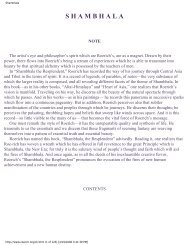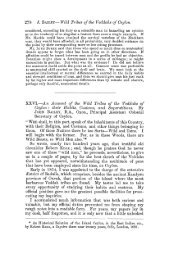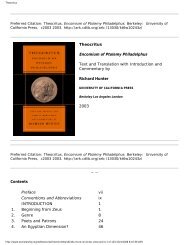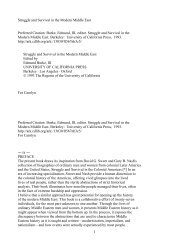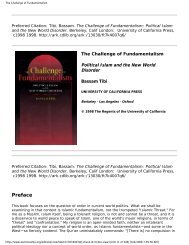Between Two Worlds Kafadar.pdf
Between Two Worlds Kafadar.pdf
Between Two Worlds Kafadar.pdf
Create successful ePaper yourself
Turn your PDF publications into a flip-book with our unique Google optimized e-Paper software.
more "pagan" than the other epics so far mentioned in terms of the presence of<br />
various elements of pre-Islamic lore; there is even a brief episode with a<br />
flying prayer-rug. Even more importantly, there are numerous instances where<br />
Saltuk gains converts among Byzantines by a display of empathy toward their<br />
Christian culture. He participates in numerous battles slaying infidels, but he<br />
can also stand by the altar in the Church of Hagia Sophia, when Constantinople<br />
is still Byzantine of course, and recite the Bible with such emotion that the<br />
Orthodox congregation dissolves into tears.<br />
These holy figures are in fact trained for such cross-cultural exercises. Both<br />
Melik Danismend and Saltuk , according to their hagiographers, were taught in<br />
their youth the "four books and seventy-two languages."[30] And what is the main<br />
purpose of Saltuk's activities? To gain converts, to expand the hold of Islam<br />
over ever-more hearts and lands. Like the Europeans in the New World who<br />
"insinuate[d] themselves into the<br />
― 72 ―<br />
preexisting political, religious, even psychic, structures of the natives... to<br />
turn those structures to their advantage", the Muslim conquerors [of not just<br />
Asia Minor] were well aware that if one wanted to achieve victory over a rival<br />
or alternative system of meanings and values, one needed to enter into that<br />
system, turn it into "a manipulable fiction," and thus subvert and appropriate<br />
it.[31] Empathy, conciliation, and improvisation can be seen in some measure as<br />
a proselytizer's tools of trade. We should be cautious, however, about reducing<br />
the ideological rivalry and exchange to semiotic gamesmanship in the service of<br />
power. Positivist cynicism may prevent us from seeing that exchange with and<br />
absorption of other truths may have been the main concern of many actors<br />
involved who might still believe in the superiority of their own side and wish<br />
to achieve its supremacy, though not necessarily in an exclusivistic sense.<br />
Obviously, then, the people of the marches did not see a contradiction between<br />
striving to expand their faith and engaging in conciliatory (not necessarily<br />
insincere) gestures toward members of the other faith. One insight gained from<br />
the hagiographies of dervishes like Sari Saltuk is that an atmosphere of<br />
"tolerance" and symbiosis (of some departure from orthodoxy), or "improvisation"<br />
in Greenblatt's vocabulary, does not preclude a desire to gain converts.[32] In<br />
fact, is it not more intelligent to be conciliatory, whenever possible, in<br />
gaining the hearts and minds of others? Why deny this insight to the people of<br />
the marches, who had been faced for centuries with the dilemma of "the other<br />
faith"? Very probably, they were acutely aware of the wonders syncretism could<br />
work, and that is precisely the insight reflected in these hagiographies, which,<br />
like the warrior epics, operate on the basis of a dualism of us against them<br />
while recognizing that the boundaries of those two spheres are constantly being<br />
redrawn. For the self-confident proselytizer, after all, the world is not<br />
divided into "us" and "them" but into "us" and "those who are not yet us" or<br />
"those who may someday be among us."<br />
Why should we suppose that the gazis or dervishes would wish to repel the<br />
Byzantine peasants when they could appeal to them? At any rate, the Saltukname<br />
provides ample proof that a call for conversion coexisted with latitudinarian<br />
66




